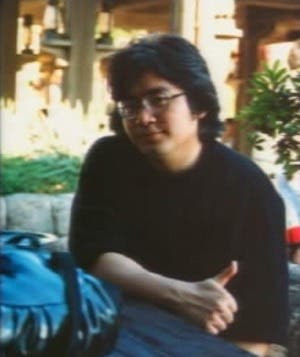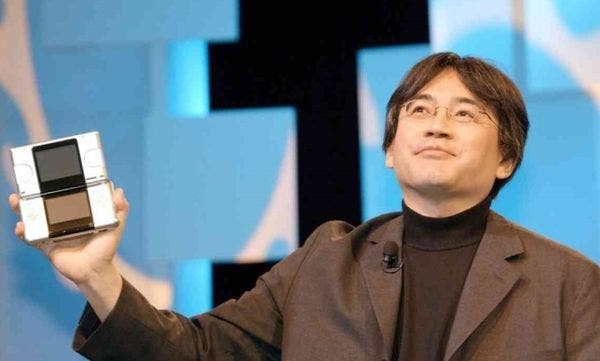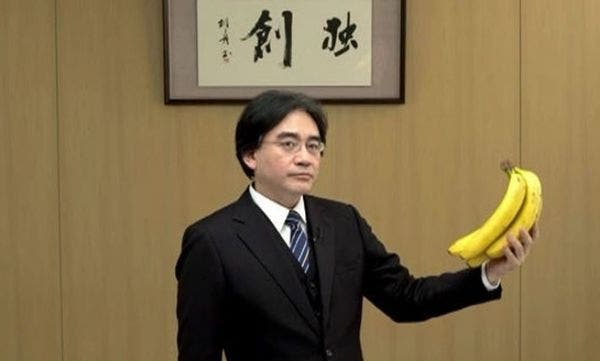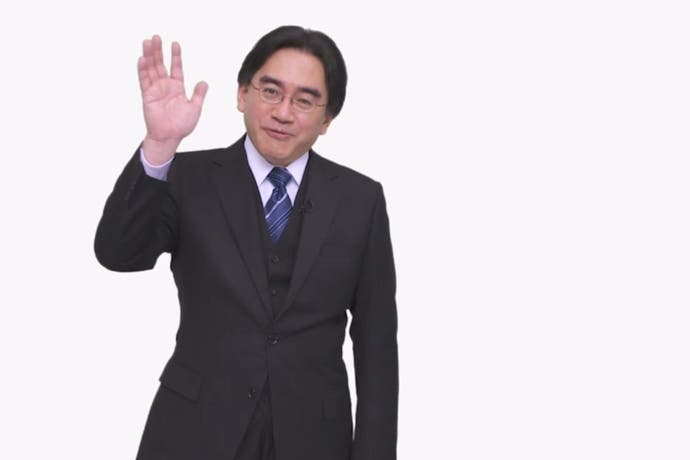Satoru Iwata: a gentle revolutionary
"It would have been more frightening to take the conventional path."
Satoru Iwata, who has passed away at the age of 55, was once seen unboxing a Wii U in a Nintendo video sporting white surgical gloves: the perfect accompaniment to a man who was gentle, self-deprecating, polite and precise. Behind the scenes, however, he was also a man who was never afraid to get his hands dirty. There's a wonderful story about him patrolling the shop floor at Nintendo's Kyoto headquarters prior to the Wii U's release, being shown the line-up for the console's impending launch in his role as the company's president. He paused on Balloon Trip Breeze, a mini-game within Nintendo Land which paid tribute to Balloon Fight, the 1984 game on which Iwata acted as programmer. Noticing something wasn't quite right with the feel of the characters as they flapped their way across the screen, he astonished everyone present as he set about fixing it - the head of the company rolling his sleeves up and getting stuck into the code.
Iwata's tenure, and the affection and respect in which he is held by developers and players alike, has been defined by this hands-on approach. Speaking to Shigesato Itoi, with whom he worked to create the SNES role-playing game Earthbound, Iwata once said he never wanted to be a mere bystander. He never was.
Born during the winter of 1959 in Sapporo, the largest city on Japan's northernmost island Hokkaido, Iwata took an early interest in electronic hardware and games, and was enduringly fascinated by the point at which the two meet. Having his first experience with games via Pong, Iwata bought an early Hewlett Packard pocket calculator and soon put it to novel use. "I think I was one of the original early adopters," he said during his 2005 GDC keynote. "But whereas some used them for mathematics, I used mine to create video games." His first game was an approximation of baseball, played out on the calculator's crude display through numbers alone. His school friends loved it.

Iwata's interests led him to the Tokyo Institute of Technology, where he studied computer science, and where he laid the foundations for his career. Alongside a group of friends, Iwata rented an apartment in Akihabara where the newly-formed club would make games all night, coding and arguing into the small hours. That company would later become HAL Laboratory - named after the computer in 2001: A Space Odyssey, Iwata noted, simply because it sounded cool - and Iwata went on to become its fifth employee when he joined full-time in 1980. "I had the distinction of joining the smallest company of any graduate in my class," he later noted with trademark modesty. "I was a programmer, an engineer and a designer. I also ordered a lot of takeaway food, and I helped clean up."
It was at HAL Laboratory that Iwata made his name, and where the lifelong relationship with Nintendo began. Their first collaboration came soon after the launch of the Famicom, although it wasn't with one of HAL's own games. Instead, HAL was drafted in to help fix one of Nintendo's titles, Pinball, which was released in 1984.
HAL would remain close to Nintendo, creating the puzzle series Adventures of Lolo while taking up work-for-hire projects. Despite its productivity, the studio experienced financial difficulties, and in 1993 found itself on the verge of bankruptcy. It was to prove a turning point in the relationship between Nintendo and HAL: Hiroshi Yamauchi, the then president of Nintendo, worked to rescue the developer, partly on the insistence that Iwata step up to the head of the studio as it became a second-party partner.
What was it that Yamauchi saw in the young Iwata? The pragmatism of the programmer likely appealed, but so too did his ability to foresee trends in the gaming market. Like Gunpei Yokoi, the engineer who helped usher Nintendo into the world of video games, he perhaps sensed a propensity for lateral thinking that fell in line with Yamauchi's approach.
The relationship between HAL and Nintendo would prove fruitful throughout the 90s, and resulted in some of the most successful games of an iconic period for the company: Kirby introduced a mascot that could sit alongside the likes of Mario while displaying a more experimental edge, the Mother series created in partnership with Itoi and Ape lent a touching humanity to the role-playing genre, and Smash Bros. saw Iwata working alongside Masahiro Sakurai to procure Nintendo's rollcall of characters for a mind-boggling battle royale.

Even as he became more senior, Iwata couldn't resist getting his hands dirty. When acting as a go-between for Game Freak and Nintendo, Iwata inserted himself into the development, porting the battle system from the Game Boy's Pokemon Red and Green to the Nintendo 64's Pokemon Stadium, completing the work without the help of any official documentation in a week.
Soon after the release of the first Super Smash Bros., Iwata would move over to work for Nintendo in a full-time capacity. In 2000, he became the head of Nintendo's corporate planning division. A mere two years later, at the tender age of 42, Iwata was appointed as Nintendo's next president, following Yamauchi's 53-year reign. Iwata was the first person outside of the Yamauchi family to take the top position since its founding in 1889, and only the fourth president in its entire history.
Iwata's appointment, he claimed in later interviews, came as a surprise. Upon being summoned to Yamauchi's offices one May afternoon in 2002, the outgoing president lectured Iwata on the challenges he had overcome, and how since inheriting the mantle in 1949 he'd turned a card manufacturing company into one of biggest names in the world of entertainment. Iwata at first feared he was about to be fired, but Yamauchi was instead handing over the baton in his own austere fashion.
"Taking into account the things I've encountered in my experiences as Nintendo president, I have come to the conclusion that it requires a special talent to manage a company in this industry," Yamauchi said at the time of Iwata's appointment. "I selected Iwata-san based on that criteria. Over the long term, I don't know whether Iwata-san will maintain Nintendo's position or lead the company to even greater heights of success. At the very least, I believe him to be the best person for the job."
Iwata would prove to be a very different president to the stern Yamauchi, carrying on the company's ideals in his own more affable manner. The Nintendo Iwata inherited was lagging behind Sony as it dominated the market with the PlayStation 2, and it had found itself scrapping for second place with console debutant Microsoft and its Xbox. During the GameCube era, Iwata helped foster relationships with the likes of Capcom that would help bolster the console's appeal - The Capcom Four that took in Resident Evil 4 and Viewtiful Joe were birthed under his watch - but it was Nintendo's next generation of hardware that would define Iwata's reign.
The Wii was a different kind of console, yet one with its foundations on a Nintendo philosophy that had held it in good stead in the past, and while Iwata helped bring the bold vision to market, it was still hardware created under the residual orders of outgoing president Yamauchi. "Coincidental to my leaving the company, I would like to make one request," Yamauchi had said. "That Nintendo give birth to wholly new ideas and create hardware which reflects that ideal. And make software that adheres to that same standard. Furthermore, this software should attract consumers as new and interesting."

Iwata's execution of Yamauchi's direction would prove to be near exemplary, and the Wii and DS era positioned Nintendo not only as a dominant force in video games but also as one of Japan's biggest companies. At the heart of both pieces of hardware was a simplicity that ran counter to the philosophy of the time, which no doubt helped their appeal to a wider market. "Today there are people who play and who don't," Iwata said as he worked to sell the concept of the Wii prior to its release in 2006. "We'll help destroy that wall between them."
The Wii's robust simplicity was what helped it appeal to a wider audience, and the same robust, playful philosophy could be seen in the handheld DS. Iwata, mindful of the younger audience he had in mind for the hardware, demanded that the final unit pass his own self-defined test. "If a kid puts a game console in the basket of their bicycle, then has to make a sudden stop, the console can come flying out - and it's not going to land on carpet. So I told [the designers] to make it so it could survive being dropped from 1.5 meters onto concrete. The hardware design team screamed, but proceeded to figure out how to pass the test."
Both the Wii and the DS would prove to be colossal successes, the Wii selling in excess of 100 million units while the DS, with 150 million units sold, would prove to be Nintendo's most popular hardware to date. The success, which opened up games to an all-new audience, can be traced back to the disruptive philosophy first put forward by Gunpei Yokoi with the original Game Boy - that of 'lateral thinking with seasoned technology' - and seen through to its logical conclusion with Nintendo's most lucrative generation of hardware. Iwata had succeeded in breaking down that wall, and the results were staggering.
"For me, I actually found that it would have been more frightening to take the conventional path," said Iwata when reflecting on the Wii's success. "Of course, no one knows the most ideal time for change. When we decided to change the direction of the ship, so to speak, we didn't know how long it would take people to understand what we were trying to achieve. Would it be in one year? Or would it be two, three, or five years down the road? We knew that there was no future on the conventional path. That path would eventually lead to a battle of sheer brute force with our competitors, and fewer and fewer consumers would be able to keep up. So the only thing we were sure of at first was the fact that we wanted to point the company in a different direction. But we weren't sure how much change the consumers were willing to accept. In any case, we knew there was no future on the path straight ahead of us, and we realised that there would be no meaning to our efforts if we were just slowly plodding towards the end of that path. So we decided to do something about it. We were convinced that if the number of people playing games increased, there would definitely be a future ahead of us."
Nintendo's next generation of hardware, arguably the first without the input of Yamauchi, struggled to match up to the success of the Wii and DS, forcing another change of direction within the company as it turned its focus back to Nintendo's more traditional audience. The wall which Iwata had broken down was built back up again, but the shift was handled deftly as Nintendo found itself back once again in the company of its most faithful fans. This open-armed approach was embodied by Iwata Asks - a series of interviews conducted by Iwata with developers of forthcoming Nintendo games - which then blossomed into the Nintendo Direct video series. Iwata proved as adept at journalism as he was at programming, at management and at presiding over a colossal corporation, his warmth helping present Nintendo as a family of which its millions of fans were members.
The last few months of Iwata's reign at Nintendo could well prove to be the most significant since its success with the Wii, the president paving the way for a new era through a partnership with mobile company DeNA as Nintendo finally embraced smart devices, and with the announcement of a new, potentially disruptive generation of hardware enigmatically dubbed NX. "You have to go forward with a sense of urgency," Iwata once said. "Time passes very quickly, and if you are complacent, you'll be too late. If you feel that the course you are on has no future, then you have to change your direction even if you're the market leader and everyone is telling you 'You're at the top, so there's no need to change. Just keep going along as you are.'"
Iwata's death sees Nintendo head into one of the most decisive moments in its history without its figurehead, though his foresight and ethos will remain with the company. For the players of Nintendo's games, they have lost someone who, through his direct approach and his self-identification as a gamer at heart, they came to consider a friend. The legacy of fun that came through Iwata's illustrious career shall remain with them.


